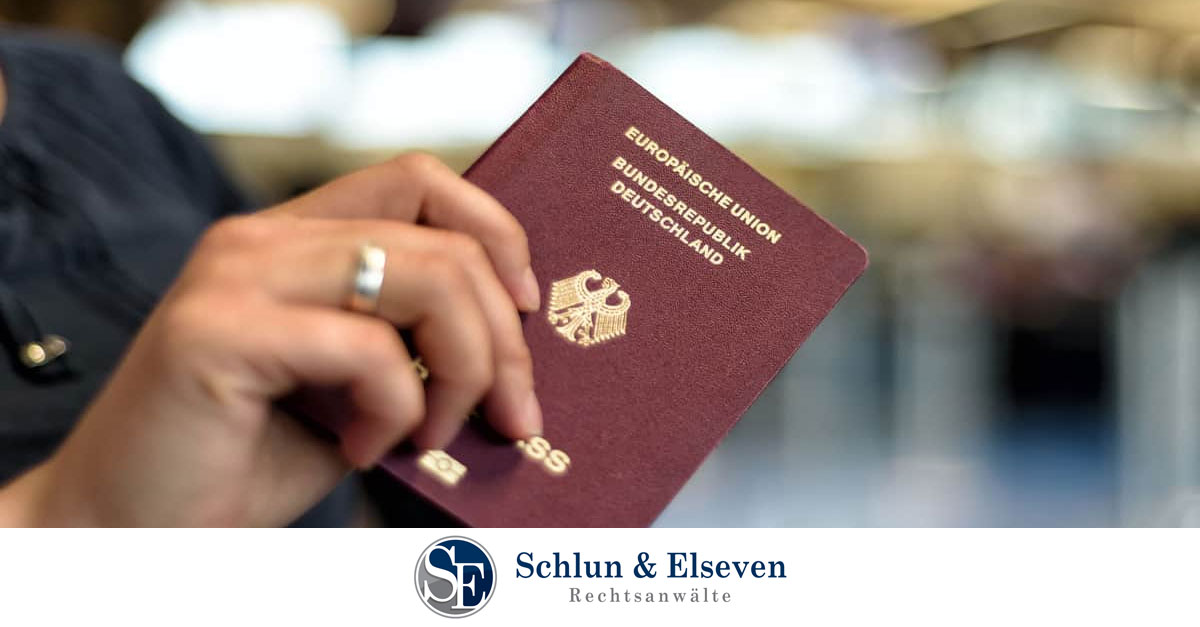With the changed understanding of gender, the principle of descent on which German citizenship law is based is also subject to change. The amendment to the German Citizenship Act (StAG), which came into force on 20 August 2021, introduced a ten-year right of declaration – for all persons who were denied German citizenship by birth in the past due to the gender-discriminatory rules of descent in force at the time. Section 5 of the German Citizenship Act allows those affected to acquire German citizenship by making a simple declaration to the competent citizenship authority. Consequently, their descendants are also entitled to such an acquisition.
The German law firm Schlun & Elseven Rechsanwälte offers skilled and committed legal advice in this context. Our lawyers will inform you about all legal and practical aspects of acquiring German citizenship. We are happy to take care of the entire application process for you to ensure that the application procedure is completed as quickly as possible. We will clarify all outstanding issues with the relevant authorities so that you can concentrate fully on your core tasks. Of course, we are also available to answer any other questions about German citizenship law. To keep up to date with the latest changes in the law, read our article on current developments in German citizenship law.

If you have a particular issue or legal question concerning German Immigration Law, you can contact our law office anytime. Our lawyers for German Immigration Law can be reached by phone, email and also provide video conferencing options. For more legal information, please visit our Immigration Information Germany Center.
Amendment to the German Citizenship Law: Implications and Considerations
On 24 June 2021, the German Bundestag approved a far-reaching amendment to German citizenship law. This created the basis for some simplifications in naturalisation, which primarily affect descendants:
- of married German mothers and foreign fathers,
- unmarried German fathers and
- mothers who lost their German citizenship by marriage before 1 April 1953.
Previously, these groups could only be granted citizenship if they could prove their ties to Germany and their language skills. However, these restrictions have been mainly removed with the changes in 2021. The new reform of the German citizenship law in 2024 will not change the requirements for acquiring citizenship by declaration in accordance with Section 5 StAG. However, it is added that according to Section 34 S. 1 StAG (updated version), anyone who has reached the age of 16 is capable of conducting procedural negotiations. As an interdisciplinary full-service law firm specialising in German citizenship law, we are happy to support you and your family in the naturalisation process.
German Citizenship: When is there an Entitlement?
After the new law comes into force, children and other descendants of German citizens will be granted a ten-year right to declare their acquisition of German citizenship if they could not acquire it by birth. The amendments to the German Citizenship Act published in the German Federal Law Gazette will make naturalisation considerably easier:
1. No more discretionary naturalisation
All persons born in German after the German Basic Law came into force (i.e. after 24 May 1949) have a right to German citizenship. The German authorities no longer have any discretionary powers. This includes the following persons:
- Marital children born before January 1975 to German mothers and foreign fathers,
- illegitimate children born before July 1993 to German fathers and foreign mothers (only after effective recognition of paternity or its determination in accordance with German law, submission of the declaration of recognition or initiation of the determination procedure before the child concerned reaches the age of 23),
- children of a mother who automatically lost her German nationality before the birth of the child by marrying a foreigner before 1 April 1953,
- children who lost their German citizenship acquired by birth through legitimation effected by a foreigner and effective under German law before 1 April 1953, and
- the descendants of all the children listed above.
2. Time limit for German citizenship
The right to naturalisation for all the above-mentioned persons exists for 10 years from the day the new law comes into force.
3. No close ties to Germany
Close ties to Germany are no longer required. If it can be proven that one of your parents was a German citizen on the day of your birth and you fall into one of the groups mentioned above, you no longer have to prove that you still have relatives in Germany, for example, or that you regularly visited them or attended a German school abroad.
4. No German language skills
Furthermore, you no longer need to provide proof of German language skills.
Who is not Eligible for Naturalisation?
Under the new regulations, however, you can no longer be naturalised if you had German citizenship after birth but then renounced it or lost it in some other way. The renunciation of German citizenship should be carefully considered for a variety of reasons. However, if you lost your German citizenship as a result of Nazi persecution, you are entitled to simplified naturalisation requirements and easier access to German citizenship under Section 7 of the German Citizenship Act (StAG) in conjunction with Section 15 of the German Displaced Persons and Refugees Act (BVFG).
Successful Application due to German Ancestors
Do you fall into one of the above groups and want to know whether you are eligible for naturalisation? Please complete our interactive questionnaire. We will then get back to you to discuss the next steps.
As a full-service German law firm, we support you throughout the entire naturalisation process, especially when communicating with the relevant German authorities. No matter what challenges you face, our lawyers are committed to ensuring that nothing stands in the way of your naturalisation.


